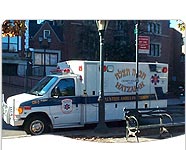 |
 
Insect Bites and Stings and Spider Bites
Topic Overview
Insect and spider bites often cause minor swelling, redness, pain, and itching. These mild
reactions are common and may last from a few hours to a few days. Home treatment is often all
that is needed to relieve the symptoms of a mild reaction to common stinging or biting insects and
spiders.
Some people have more severe reactions to bites or stings. Babies and children may be more
affected by bites or stings than adults.
Examples of problems that are more serious include:
• A severe allergic reaction (anaphylaxis). Severe allergic reactions are not common but can
be life-threatening and require emergency care. Signs or symptoms may include:
o Shock, which may occur if the circulatory system cannot get enough blood to the vital organs.
o Coughing, wheezing, difficulty breathing, or feeling of fullness in the mouth or throat.
o Swelling of the lips, tongue, ears, eyelids, palms of the hands, soles of the feet, and mucous
membranes (angioedema).
o Lightheadedness and confusion.
o Nausea, diarrhea, and stomach cramps.
o Hives and reddening of the skin. These symptoms often occur with other symptoms of a
severe reaction.
• A toxic reaction to a single sting or bite. Spiders or insects that may cause this include:
o Black widow spider.
o Brown recluse spider.
o Hobo spider.
o Scorpion.
o Puss caterpillar (woolly slug).
• A toxic reaction to multiple stings or bites from a bee, wasp, or fire ant.
o A bee leaves it stinger behind and then dies after stinging. Africanized honeybees, the so-called
killer bees, are more aggressive than common honeybees and often attack together in great numbers.
o Wasps, including hornets and yellow jackets, can sting over and over. Yellow jackets cause the
greatest number of allergic reactions.
o A fire ant attaches to a person by biting with its jaws, then, pivoting its head it stings from its
abdomen in a circular pattern at multiple sites.
• A large skin reaction at the site of the bite or sting.
• A skin infection at the site of the bite or sting.
• Serum sickness. This is a rare reaction to the medications (antiserum) used to treat a bite or sting.
Serum sickness may cause hives and flulike symptoms 7 to 14 days after the use of antiserum.
• A virus infection. Infected mosquitoes can spread the West Nile virus to people, causing an inflammation
of the brain (encephalitis). For more information, see the topic West Nile Virus.
• A parasite infection. Infected mosquitoes can spread malaria. For more information, see the topic Malaria.
If you think you need emergency care, call 911 or other emergency services immediately. If you are
concerned about your symptoms, call your health professional.
Author: Susan Van Houten, RN, BSN, MBA
Last Updated February 27, 2004
Medical Review: William M. Green, MD - Emergency Medicine, H. Michael O'Connor, MD - Emergency Medicine
This information is not intended to replace the advice of a doctor. Healthwise disclaims any liability
for the decisions you make based on this information. For more information, click here.
© 1995-2004, Healthwise, Incorporated, P.O. Box 1989, Boise, ID 83701. ALL RIGHTS RESERVED.
Back to Safety Tips Index
|









